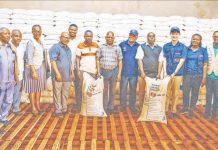Africa-Press – Tanzania. West Africa produces nearly 70% of the world’s cocoa, yet smallholder farmers in countries like Nigeria, Ghana, and Côte d’Ivoire continue to face chronic underpayment, volatile markets, and limited access to financing.
In our special report, we spoke with Olasunkanmi Owoyemi, Managing Director at , who offered a candid look at the sector’s pain points — and potential.
“The biggest challenge remains access to affordable credit,” said Owoyemi. “Without financing, farmers can’t invest in better tools, practices, or even proper storage, which impacts quality and income.”
Sustainability also remains a concern, with child labour and gender inequality still widespread in cocoa-producing communities. Owoyemi highlighted how SGC is tackling this through women’s empowerment programs, education support, and transparent sourcing.
? East Africa Surges Ahead with Nearly 6% Growth
While the continent collectively anticipates a 4% growth in 2025, East Africa is racing ahead, posting a projected 5.9% growth rate — among the highest in the world.
What’s driving this boom? A mix of factors:
Investment in infrastructure and energy
Booming sectors in technology, fintech, and tourism
Improved regional trade through the African Continental Free Trade Area (AfCFTA)
Investment in infrastructure and energy
Booming sectors in technology, fintech, and tourism
Improved regional trade through the African Continental Free Trade Area (AfCFTA)
Countries like Ethiopia, Kenya, Rwanda, and Tanzania are spearheading the momentum. Experts note that policy consistency, public-private partnerships, and macroeconomic stability are helping the region defy global headwinds.
Central African Republic’s Coffee Sector: Holding On Amid Adversity
In the Central African Republic, coffee was once a lifeline for thousands of families. Today, the industry is hanging by a thread, battered by insecurity, cross-border smuggling, and lack of government support.
Many growers have been forced to abandon their farms due to armed conflict and falling prices. Yet, in towns like Boali and Berbérati, a few resilient producers continue to cultivate, hoping for international partnerships and a return to peace.
“We grow because we believe coffee can still be a path to dignity,” said one farmer.
International aid, institutional reform, and agritech investment could help revive this forgotten sector — but time is running out.
For More News And Analysis About Tanzania Follow Africa-Press







